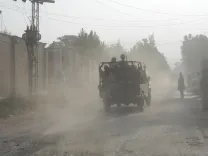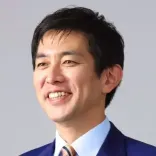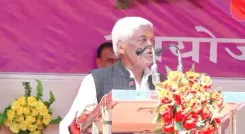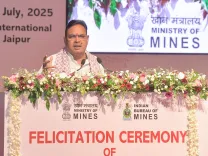What Happened to the More than 310 South Koreans Released After U.S. Immigration Detention?
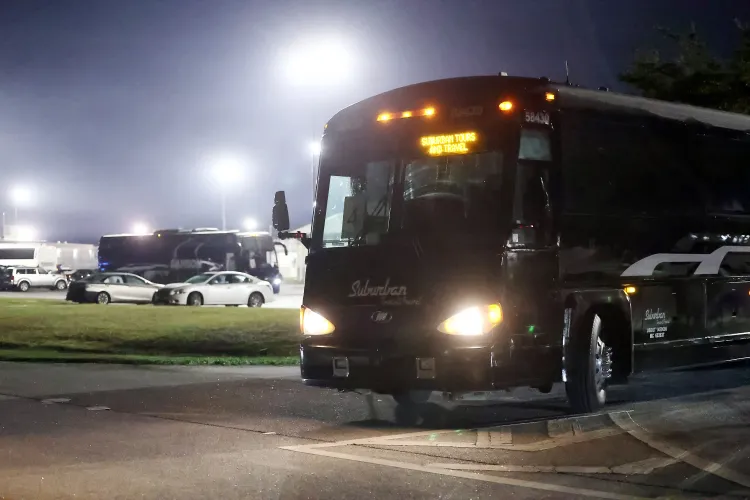
Synopsis
Key Takeaways
- 316 South Korean workers released after immigration crackdown.
- Diplomatic negotiations were crucial in securing their freedom.
- Incident raises questions about U.S.-Korea business relations.
- Concerns about the stability of foreign worker policies.
- Potential for new visa categories for skilled workers discussed.
Washington, Sep 11 (NationPress) Over 300 South Korean workers who were apprehended during a recent US immigration enforcement operation were set free on Thursday, concluding a weeklong diplomatic effort by Seoul to resolve the extraordinary mass detention of its citizens by their primary treaty ally.
A total of 316 Korean nationals departed from a detention facility in Folkston, Georgia, exactly one week after their capture during a raid at an electric vehicle (EV) battery plant construction site managed by a joint venture of Hyundai Motor Group and LG Energy Solution in Bryan County, close to Savannah.
Alongside 14 international workers, the Koreans will embark on a bus journey lasting about 4.5 hours to reach Hartsfield-Jackson Atlanta International Airport in Atlanta, where they will board a chartered Korean Air flight for their return home under the guise of “voluntary departure” instead of deportation, as reported by Yonhap News Agency.
Buses transporting the workers have departed the facilities and are en route to the airport.
The flight is anticipated to take off at noon (local time) and arrive in Korea by Friday.
The release of the workers was delayed by a day after US President Donald Trump encouraged them to remain in the United States, according to Seoul officials, as his administration seeks enhanced collaboration with Korean enterprises to rejuvenate various sectors like shipbuilding, chipmaking, and automotive.
In total, 475 individuals, including the Koreans, were detained at the EV battery site, which is a significant example of economic partnership between the two nations, in what Immigration and Customs Enforcement (ICE) officials labeled the “largest single site enforcement operation” in the history of Homeland Security Investigations.
ICE reported that many were working unlawfully in the US, including those on short-term or recreational visas that prohibit employment. Most Korean workers reportedly held B-1 temporary visitor visas or participated in a visa waiver program.
Guided by Cho Ki-joong, the consul general at the Korean Embassy in Washington, a support team provided necessary consular aid to the Koreans, while other high-ranking officials, including Foreign Minister Cho Hyun, dedicated their efforts to ensure their prompt release and safe return.
The workers and their employers were taken by surprise by the raid, challenging their long-standing perception that the US, as an ally, was a reliable destination for investment and business collaboration.
This crackdown raised concerns over the potential strain on bilateral relations, especially as ICE footage showing the Koreans in handcuffs and chains incited shock and anger in South Korea, prompting questions about the stability of Korean businesses in the US.
“This incident further undermines the credibility of the US as a dependable partner or ally in Korea and beyond,” remarked Rob Rapson, former acting US ambassador to South Korea, in an email to Yonhap News Agency.
The raid occurred just ten days after South Korean President Lee Jae Myung and Trump sought to strengthen their personal relationship during an in-person summit at the White House, following a framework trade agreement in late July, wherein Korea pledged to invest USD 350 billion in the US.
Some analysts suggest that the detention of Korean workers may present an opportunity to spotlight the enduring visa challenges faced by Korean businesses striving for stable pathways to deploy skilled labor in the US.
During discussions with US Secretary of State Marco Rubio, Foreign Minister Cho proposed establishing a working group to deliberate on a new visa category for Korean workers, a suggestion Rubio indicated he would “actively review,” according to officials from Seoul.
Cho also secured US assurances that the detained Korean workers would not face any disadvantages, such as limitations on their reentry into the US.
The weeklong detention weighed heavily on the South Korean president's mind, who has declared the South Korea-US alliance as the very foundation of his administration's security and foreign policy.
“I feel a great sense of responsibility as a president who bears ultimate responsibility for the safety of citizens,” he stated during a Cabinet meeting on Tuesday.
Critics argue that the raid further highlights the contradictions in Trump's policy, which has employed tariffs to attract foreign investments while implementing a stringent immigration policy that incites fear among foreign workers essential for driving these investment endeavors.
Mindful of criticism regarding immigration crackdowns, Trump indicated his readiness to explore legal avenues to enable foreign companies investing in the US to bring their “smart” and “highly skilled” personnel into America to hire and train US workers.


